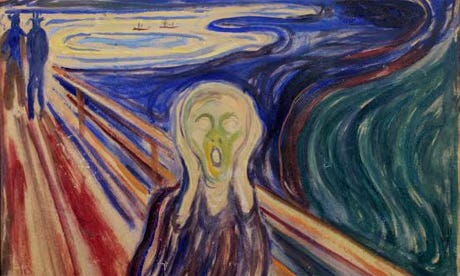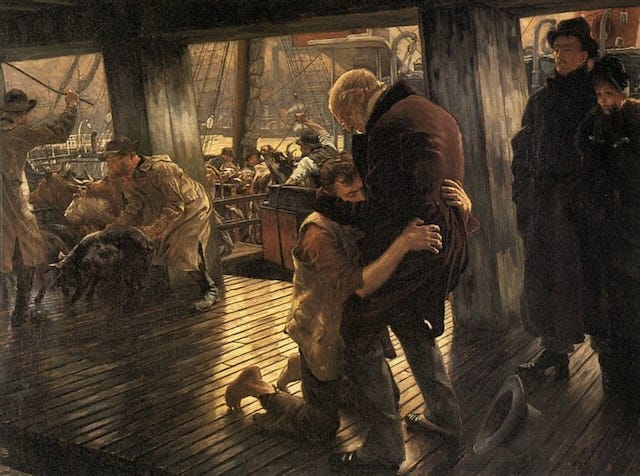Fear is, according to an online dictionary, "an unpleasant emotion caused by the belief that someone or something is dangerous, likely to cause pain or a threat. It is an anticipation or an awareness of danger.”
I am not a fearful person in the sense that fear keeps me from me acting. But I live with fear, like many of you do. Right now, I fear that my water pipes might break in this crazy cold weather we are having—despite taking all the precautions I could. Over the last six months, I fear my body breaking down since I have torn my ACL in my knee and a rotator cuff in my shoulder. I fear an upcoming shoulder surgery will be painful and render me unable to do many of the things I enjoy. I have, however, continued exercising to the best of my ability in order to prepare. For the past four months, when I get on an airplane, I feel panic arising as the plane fills up and I can’t breathe. Nevertheless, I am about to take a 24-hour trip in an airplane. Fear of failure, future cognitive impairment, running out of money and being alone are a few other fears that pop up at the most unexpected times. My fears seem to be closely linked to anxiety.
What do you fear?
How do you deal with it?
Ignore or deny your fear? Seek out self-protection? Don’t trust anyone? Escape? Accumulate stuff?
What about trust? Trusting God.
Psalm 27 suggests we trust God when we are afraid.
But when I am afraid, I may not want to trust anyone, much less God. Ortberg writes, “Fear whispers to us that God is not really big enough to take care of us. It tells us we are not really safe in his hands. It causes us to distort the way we think about him.” So that means that I need to know and remember who God is, in those fearful moments. Don’t be deceived or get puffed up. This is not easy.
The person who trusts God in Psalm 27, Goldingay warns is “not a person who trusts God because of some personal capacity for trust, because of being a person of faith, because of a capacity to laugh at dangers, or because of making an act of existential commitment to trust.” They are a person who “trusts in God because of something God did.” They trust God because they have confidence in His character.
I struggled with this post in part because I struggle with the problem of evil. Where is God when bad things happen? But I don’t have to solve the problem of evil to keep trusting God and living courageously. Even when fear and anxiety loom.
When I feel fear or anxiety, I can say, “My heart will not fear.” (Psalm 27:3).
Despite circumstances outside of my control (an army attacking, finding myself in the middle of a war), I can keep trusting. (27:3) ESV says, “Yet I will be confident.” But this verse uses Batah, or trust, the same word that is used in Psalm 56:3-4 “When I am afraid, I put my trust in you. In God, whose word I praise, in God I trust; I shall not be afraid. What can flesh do to me?” So, I like the use of trust here.
When I face evil, adversaries and enemies, I can know that they will eventually “stumble and fall.” (27:2). Evil will never have its way with me. I may suffer loss or face danger but I am not alone in doing so.
God is my light “Light dispels darkness and darkness represents evil, confusion, gloom and despair,” says Ross. Even the darkness of the shadow of death (Psalm 23:4) is not to be feared.
“Indeed, you light my lamp, LORD. My God illuminates the darkness around me.” Psalm 18:28
My enemies, do not gloat over me! Though I have fallen, I will get up. Though I sit in darkness, the LORD will be my light. I must endure the LORD’s fury, for I have sinned against him. But then he will defend my cause and accomplish justice on my behalf. He will lead me out into the light; I will witness his deliverance. Micah 7:8-9 NET Bible
1 John 1:5 This is the message we have heard from him and proclaim to you, that God is light, and in him is no darkness at all.
God is my salvation God brings a promise of victory or deliverance in my fear. “Deliverance” denotes action that rescues people from the attack of wicked people or from illness.” (Goldingay)
“The LORD is my high ridge, my stronghold, my deliverer. My God is my rocky summit where I take shelter, my shield, the horn that saves me, and my refuge.” Psalm 18:2 NET Bible
God is my stronghold He is my strength. He is a place of safety when fear strikes. He provides refuge when I am afraid from dangers or attacks.
The LORD is the strength of his people; he is the saving refuge of his anointed. Psalm 28:8
Incline your ear to me; rescue me speedily Be a rock of refuge for me, a strong fortress to save me! Psalm 31:2
Twice in verse 1, the Psalmist says “Whom shall I fear?” Even if I need not fear, I sometimes still do. It is then, that I need courage. Courage to trust. Courage to keep growing. Ortberg says, “Growth always involves risk, and risk always involves fear.” Courage comes from trusting someone other than myself. The Bible tells us not to fear over 300 times. Maybe the command to not fear is more of a statement to not allow fear to control your life or keep us from doing what God wants us to do.
It is okay to take time to assess the risk and evaluate the cost of moving ahead. “There is a place for fear,” says John Ortberg, but “I never want the no of fear to trump the yes of faith.”
Ortberg suggests that we rate ourselves on a Fear Management Scale from 1–10 where 1 is “I’m often paralyzed by fear” and 10 is “I almost never let fear stop me.” How would you do? All my quotes in this post are from his book, If You Want to Walk on Water, You’ve Got to Get Out of the Boat.
“Fear not, for I have redeemed you; I have called you by name, you are mine. When you pass through the waters, I will be with you; and through the rivers, they shall not overwhelm you; when you walk through fire you shall not be burned, and the flame shall not consume you. For I am the LORD your God, the Holy One of Israel, your Savior. I give Egypt as your ransom, Cush and Seba in exchange for you. Because you are precious in my eyes, and honored, and I love you, I give men in return for you, peoples in exchange for your life. Fear not, for I am with you; Isaiah 43:1-5





Great challenge and reminder. As I age, I too have fears of the unknown and fears of the future. It is helpful to remember that our trust is in God, not the events and circumstances around us.
Thanks Jon. Getting these things out in the open and talking about them helps a lot imho. Just like in Hebrews 11, when I see someone else trusting God/demonstrating faith, I am also encouraged to do so.